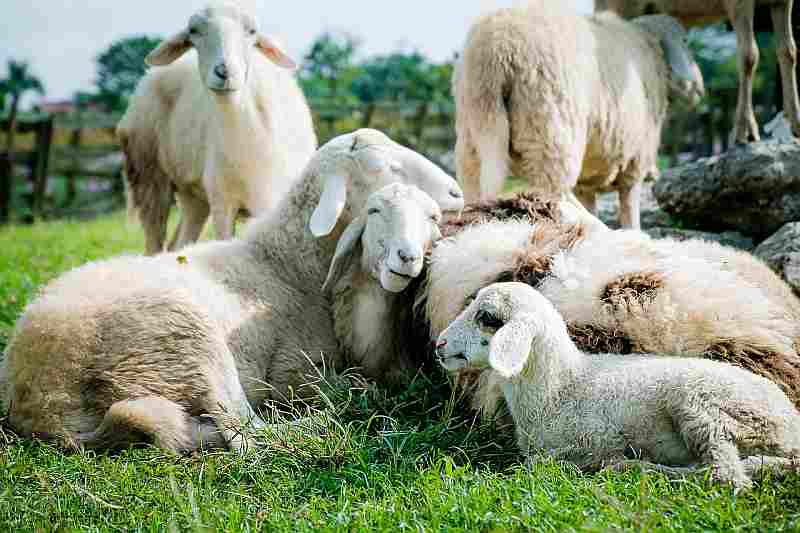Have you ever wondered how long sheep can grace our pastures? You’re not alone. Delving into the sheep’s lifespan, you’ll discover many factors contributing to their longevity.
Their life expectancy varies from the pastoral idyll of domestic sheep to their wild counterparts. In this article, we’ll explore health management, disease control, and practices that can enhance their lives. You’ll gain precise insights into what determines the years these woolly creatures enjoy, shedding light on how long do sheep live.
Understanding Sheep Lifespan
Sheep typically live for 6 to 12 years, depending on breed, healthcare, and living conditions. Your understanding of sheep lifespan must include an awareness of sheep genetics and breed variations, as these are pivotal in determining longevity. Genetic makeup profoundly influences traits such as disease resistance, reproductive capabilities, and adaptability to environmental stressors, all of which play substantial roles in lifespan.
Breed variations contribute to these genetic distinctions. For instance, some breeds have been selectively engineered for enhanced wool production or meat yield, potentially compromising longevity. Conversely, breeds less altered by human selection may exhibit stronger natural survival traits.
Thorough knowledge of these genetic and breed-specific characteristics allows for informed management practices to optimize your sheep’s health and lifespan.
Factors Affecting Sheep Longevity
Considering your sheep’s breed characteristics, you’ll find that nutrition, health management, and environmental factors significantly impact their longevity. Sheep genetics play a pivotal role in determining their life expectancy, with some breeds inherently predisposed to longer lives.
Moreover, their survival is heavily influenced by:
- Nutritional Adequacy: Optimal feeding regimens tailored to life stages and physiological demands.
- Healthcare Protocols: Preventative and curative measures against diseases and parasites.
- Environmental Influences: Pasture quality, shelter, and climate conditions.
Each element is interrelated, requiring a holistic approach to shepherd your flock towards a longer, healthier life. You’re tasked with navigating these complexities, leveraging scientific insights to cultivate an environment where each sheep can thrive, thus extending their natural lifespan.
Average Lifespan of Domestic Sheep
Building on these key factors, you’ll find that domestic sheep typically live between 10 and 12 years when well-cared for. Sheep genetics play a pivotal role in determining the lifespan of these animals. Specific genes are responsible for traits that contribute to longevity, including resistance to disease and overall hardiness.
Breed variations also affect lifespan; certain breeds are genetically predisposed to longer lives. For instance, Merino sheep are known for their robust health and often exceed the average lifespan. Conversely, breeds that grow rapidly and are bred for meat production may not live as long due to the stress on their bodies.
To maximize longevity, it’s crucial to provide optimal living conditions, including proper nutrition, veterinary care, and a safe environment. This clinical approach ensures a quality life for domestic sheep.
Life Expectancy in Wild Sheep
In contrast to their domestic counterparts, wild sheep generally have a shorter lifespan, often living between 6 to 8 years due to harsher living conditions and natural predators. The factors influencing this reduced longevity are multifaceted:
- Sheep Predators: Predation by wolves, bears, and large cats significantly impacts survival rates.
- Habitat Challenges: Rugged terrains and extreme weather conditions pose significant risks.
- Resource Competition: Limited access to food and water due to competition with other wildlife.
An informed examination reveals that these variables directly correlate with mortality rates in wild sheep populations. It’s critical to understand that while these factors are natural components of their ecosystem, they unequivocally diminish the life expectancy of these ungulates compared to their domesticated relatives.
Health and Disease Management
You’ll notice a significant increase in the lifespan of sheep when effective health and disease management practices are implemented, extending their lives beyond those of their wild counterparts.
Understanding sheep genetics plays a pivotal role in identifying hereditary conditions and breeding for disease resistance, thus reducing mortality rates.
Vaccinations, regular deworming, and proper nutrition are essential in preventing common infectious diseases and parasitic infestations.
It’s crucial to monitor for symptoms of illness and address any health concerns promptly to prevent outbreaks that can lead to higher mortality.
You will enhance their well-being by maintaining clean housing, providing adequate space, and minimizing stress.
Adhering to these health management protocols, you contribute to the longevity and productivity of your flock.
Enhancing Sheep Longevity Practices
To maximize the lifespan of your sheep, it’s essential to adopt optimal nutrition strategies tailored to their specific life stages and needs.
You must also implement preventive health measures, including regular vaccinations and parasite control, to mitigate the risk of disease.
Furthermore, stress reduction techniques can significantly enhance their overall well-being and longevity.
Optimal Nutrition Strategies
Proper diet management can significantly extend your sheep’s lifespan, ensuring they receive the necessary nutrients for optimal health. You must be aware of their dietary needs and adjust their intake accordingly to achieve this. Sheep supplements are critical in bridging nutritional gaps, especially when natural forage quality is suboptimal.
Grazing patterns should be managed to allow pastures to regenerate, providing a sustainable source of nutrition. Consider these strategies:
- Rotational Grazing: Implement a system that promotes pasture recovery and prevents overgrazing.
- Supplemental Feeding: Offer minerals and vitamins that may be deficient in their primary diet.
- Forage Analysis: Regularly assess forage quality to tailor supplementary feeding programs effectively.
Adhering to these guidelines helps ensure the vitality and longevity of your flock.
Preventive Health Measures
Regular health checks and vaccinations are essential to preventing diseases that can shorten your sheep’s life. Sheep vaccinations play a pivotal role in protecting against common infectious diseases such as clostridial diseases and pneumonia. A rigorous vaccination program, tailored to your flock’s specific needs, will significantly reduce the likelihood of disease outbreaks.
In addition to vaccinations, genetic selection is a powerful tool for enhancing sheep longevity. By selecting for traits associated with robust health and longevity, you can gradually improve the overall resilience of your flock. This long-term strategy contributes to the health of individual animals and the sustainability and productivity of your sheep farming operation.
Stress Reduction Techniques
Considering stress reduction techniques, you’ll find that managing your sheep’s environment to minimize stress is crucial for extending their lifespan. Stress can significantly impact the longevity and well-being of sheep, making the following practices essential:
- Provide adequate shelter and comfortable resting areas to shield the flock from extreme weather conditions.
- Implement a consistent and calm routine for feeding and handling to prevent anxiety and promote flock harmony.
- Explore innovative approaches like ‘sheep meditation,’ where creating a serene environment may facilitate relaxation and social cohesion within the flock.
These strategies are integral in cultivating a stress-free habitat. By ensuring a tranquil atmosphere and maintaining routine care, you’re enhancing their quality of life and potentially increasing the years they grace your pastures.
Frequently Asked Questions
What Are the Record-Holding Ages for the Oldest Sheep Ever Documented, and Where Were They From?
You’re inquiring about historical sheep records; the oldest documented sheep lived 28 years. Sheep longevity factors include genetics and care. These record-holders hailed from Australia and the United Kingdom, demonstrating exceptional lifespans.
Can Sheep Recognize Their Owners or Caregivers, and Does Human Interaction Impact Their Lifespan?
Sheep intelligence allows you to be recognized by your flock, and your interactions can affect their stress levels, which might impact their longevity. It’s critical to maintain positive, consistent contact for their well-being.
How Do Sheep’s Lifespans Compare to Those of Other Domesticated Farm Animals Like Goats or Cows?
Sheep generally live shorter lives than cows, yet often outlast goats. Your flock’s longevity hinges on comparative physiology and specific care factors, ensuring each species’ lifespan reflects its unique biological and environmental demands.
Are There Any Known Genetic Mutations in Sheep That Have Been Linked to Unusually Long or Short Lifespans?
Yes, genetic research has identified mutations in sheep that affect their lifespans. Lifespan studies indicate certain genes can lead to longer or shorter lives, though these findings are still under investigation.
How Does the Diet of Sheep in Different Cultural or Regional Practices Affect Their Overall Lifespan Compared to the Standard Feed?
You’ll find that dietary diversity, including regional forages, can influence sheep’s health. Different diets affect their longevity, with some practices potentially extending or reducing life expectancy compared to standard feed regimens.
Conclusion
In the tapestry of life, sheep are threads of resilience, their longevity woven by care and environment. You’ve learned that domestic sheep often graze to the beat of a decade, while their wild kin may fall short.
Vigilance in health management can stretch their years, much like shepherds extending the wool on a loom. Embrace these practices, and you’ll see your flock not just survive, but thrive, embodying the cycles of life in pastoral harmony.

